Top Tips to Get From Transitional Care to Home
Barb Johnson | Dec 27, 2016
When you reside in a transitional care center, you have a dedicated team of health professionals working with you or your loved one to regain total independence. It's an exciting time, and it passes very quickly. In fact, Residents transition out of this type of care almost as quickly as they transition into it. Because of this, it's important for your or your loved one to be prepared to come home.
Making a Smooth Transition
 For those who need it, transitional care is a wonderful thing. It's a temporary care situation for individuals in need of additional care or rehabilitation after surgery or illness. Prepare for your return home with these tips.
For those who need it, transitional care is a wonderful thing. It's a temporary care situation for individuals in need of additional care or rehabilitation after surgery or illness. Prepare for your return home with these tips.
Tip #1: Exercise Your Independence
One of the top goals of transitional care is restoring independence. Oftentimes, after illness, injury, or a medical procedure, individuals need a little extra time for healing and strengthening before they are completely independent. As a result, transitional care centers have skilled Staff 24/7 to help anyone who may need it. As you regain independence, it's important to do as much for yourself as you possibly can in preparation for when you're at home and may be alone or unassisted for extended periods of time.
Tip #2: Rely on Your Loved Ones
The skilled Staff and medical Professionals you work with at a transitional care center offer more than just medical support. There's also plenty of social interaction throughout each and every day. This can cause some to feel extra quiet during those first days back. To ease the transition, it's good to have Family and Friends stop in to provide a little extra interaction. This is a great practice for those looking to ease any feelings of loneliness that might creep in.
Tip #3: Communicate Your Wants and Worries
During your time in transitional care, you'll have a wonderful group of Staff and medical Professionals helping you regain your independence, and they'll determine your readiness through both assessments and conversations. If at any time you feel unsure or worried about whether one of your wants or needs will be met once you go home, please communicate that concern. There are seemingly endless tools and resources for independent adults to use when they are home alone, and your transitional care team has likely helped someone with a similar concern before.
Tip #4: Make a Plan and Share It
Everyone's experience with senior transitional care differs, and there are steps you can take so that your experience (or the experience of your loved one) is the best possible. One of the best ways to stay prepared and ensure all needs are met is by making a plan, sharing your plan, and sticking to your plan. Involve both your family and your care team in the conversation, and ensure everyone involved understands what actions and results need to occur.
Senior Transitional Care at Walker Methodist
Senior transitional care at Walker Methodist is an opportunity to take an active role in ensuring you or your loved one receives the appropriate level of care to regain independence. Because transitional care is temporary, it's important to think about how you or your loved one will make a smooth transition back home. If you have any questions about transitional care at Walker Methodist, you can request information here.
